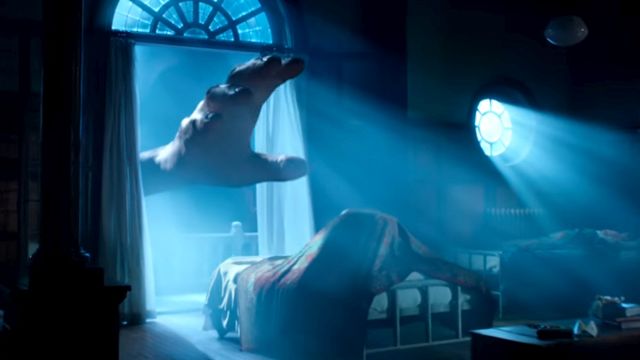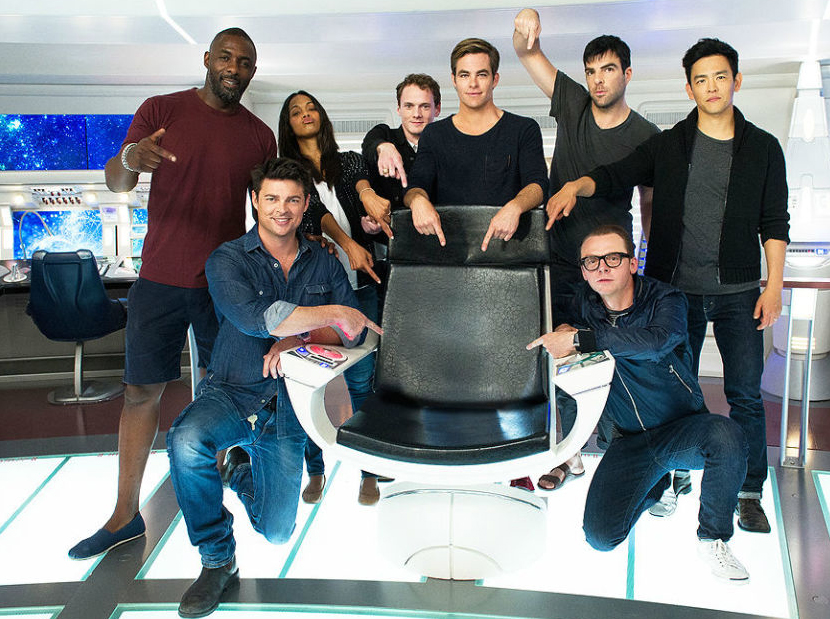Stanley Kubrick’s Barry Lyndon (1975), which has been re-released, is one of the most stately costume dramas films ever made. It is also a monument to tedium, a tale told so deliberately, ponderously, and humorlessly that it raises the question, as do Kubrick’s Paths of Glory, 2001: A Space Odyssey, Full Metal Jacket, and Eyes Wide Shut, of whether their maker was a genuine master or is a sacred cow.

Stretching relations till they snap is Thomas Vinterberg’s abiding theme. In his iconoclastic, Dogme 95-instigating youth, accusations of incest and gross bad manners smashed the respectable veneer of Festen’s family. In his fiercely gripping comeback The Hunt, Mads Mikkelsen was violently ostracised from his small community when falsely accused of child abuse. Now The Commune looks at the titular try for an ideal community in 1975 Copenhagen, and its fracture due to the usual human failings.

When Matt Damon's Jason Bourne makes his introductory appearance, as a bare-knuckle boxer somewhere in the lawless Greek-Albanian borderlands, it speaks volumes. Bourne is severely muscled-up, but he looks older, wearier and existentially imperilled. You could say much the same for this belated franchise addition, which is bristling with technology and intensely-detailed action scenes, but struggles to find much that wasn't done better, or more purposefully, in the earlier films.

Two cultural giants from different spheres align to occasionally sublime results in The BFG. Steven Spielberg's film locates the beatific in its (literally) outsized star, Mark Rylance, but lapses into the banal when its eponymous Big Friendly Giant – Roald Dahl's 1982 literary creation made motion-capture fresh – isn't careering across the screen.
As a sort of companion piece to E.T., which shares this film's screenwriter, Melissa Mathison, who died last year, the film brings an otherworldly presence into our world of the everyday. And yet there remains something pro forma about the abiding feel of a movie that doesn't break much thematic or emotional ground. It allows its Oscar-winning leading man to continue his conquest of celluloid following a life spent mostly on stage. But Rylance aside, the rest of a game English cast can politely be said to be along for the ride, though I doubt Dame Penelope Wilton – as she now is – ever thought she'd get to play the Queen and fart at the same time: how jolly!
 The Elizabeth II sequences arrive relatively late in the day and are the least engaging aspects of a venture that is so beautifully anchored by Rylance with his kindly yet baleful eyes that one slightly cringes as and when The BFG turns into an ad hoc advertorial for the royals: Visit Britain will have something new on which to hang its hat. Meanwhile Rebecca Hall and Rafe Spall the rest of a name English – both playing personnel of the Palace – add a Spielberg title to their CVs. If only either actor were in any way challenged by what they are asked to do; Wilton (pictured above), for her part, sticks to a general air of bemusement throughout.
The Elizabeth II sequences arrive relatively late in the day and are the least engaging aspects of a venture that is so beautifully anchored by Rylance with his kindly yet baleful eyes that one slightly cringes as and when The BFG turns into an ad hoc advertorial for the royals: Visit Britain will have something new on which to hang its hat. Meanwhile Rebecca Hall and Rafe Spall the rest of a name English – both playing personnel of the Palace – add a Spielberg title to their CVs. If only either actor were in any way challenged by what they are asked to do; Wilton (pictured above), for her part, sticks to a general air of bemusement throughout.
Far better is anything involving the dream-friendly creature of the title, a being as large-eared as he is thin-necked to whom Rylance imparts a wounded beneficence. Applauded all the way to an Academy Award for his debut assignment for Spielberg on Bridge of Spies, the determined maverick that is Rylance clearly meets this uber-mainstream director more than halfway, and one is heartened to hear that the pair have two further collaborations on tap. (Move over, Martin Scorsese and Leonardo DiCaprio.)
Noted for language that might give even Edward Lear or James Joyce pause, the BFG intersperses his cod-philosophising about dreams with words like Frobscottle (the fizzy beverage shown above), "glummy", and (my favourite phrase) "a dibble of despair" – utilised by the BFG as a way of envisaging a mostly but not entirely rosy future for Sophie (Ruby Barnhill), the bespectacled 10-year-old who finds in the giant at once an ally, chum, and escape route from her Dickensian routine. Not for nothing is the charming, commendably unaffected Barnhill glimpsed reading Nicholas Nickleby.
 The BFG is brought down to size by the bullying like of the Fleshlumpeater (Jemaine Clement), one of a forbiddingly beefy brigade of nasties who are less generously inclined to Sophie than her new-found protector-friend. Kids will doubtless surrender to the occasional grossout value of the Giant Country goings-on, but Spielberg seems far more naturally suited to the earlier meanderings of his camera around and above a storybook London of ghostly, largely Georgian charm. Let's just say that the scene-setting is more alluring than what happens once we actually settle in.
The BFG is brought down to size by the bullying like of the Fleshlumpeater (Jemaine Clement), one of a forbiddingly beefy brigade of nasties who are less generously inclined to Sophie than her new-found protector-friend. Kids will doubtless surrender to the occasional grossout value of the Giant Country goings-on, but Spielberg seems far more naturally suited to the earlier meanderings of his camera around and above a storybook London of ghostly, largely Georgian charm. Let's just say that the scene-setting is more alluring than what happens once we actually settle in.
And Rylance is a softly spoken, gently accented wonder throughout, his character's innocence a comfort to the parentless Sophie and a rebuke to almost everyone else. So what if in his socially maladroit state the BFG sends one of the Queen's Louis XIV chandeliers crashing to the ground? Possessions, the film at its best reminds us, can be replaced (well, maybe not in that case). In his state of grace, Rylance's BFG allows a comparatively prosaic Spielberg offering access to the ineffable realm of the poetic.
MARK RYLANCE’S BIGGEST HITS ON STAGE AND SCREEN
Bridge of Spies. Spielberg's warm-hearted Cold War thriller is lit up by Tom Hanks and Mark Rylance
Endgame. In Complicite's homage to Beckett, Rylance's Hamm is an animated, self-lacerating lout
 Farinelli and the King. A witty and moving new play is a timely reminder of just why art matters
Farinelli and the King. A witty and moving new play is a timely reminder of just why art matters
Jerusalem. Rylance is unforgettable as Johnny Rooster Byron in Jez Butterworth’s smash Royal Court hit
La Bête. Rylance dazzles in astonishing opening monologue, but this callow play coasts on the performances
Nice Fish. Rylance is waiting for cod-ot in this absurdist West End trifle
Twelfth Night/Richard III. Rylance doubles up as Olivia and the hunchbacked king (pictured above) for Shakespeare's Globe
Wolf Hall. Mark Rylance works rare marvels as Hilary Mantel's scheming Tudor fixer
PLUS ONE TURKEY
Much Ado About Nothing. Rylance Old Vic staging of Shakespeare's romantic comedy with elderly leads gets lost in translation
Overleaf: watch the trailer for The BFG

This is the third of the rebooted new generation Star Treks, and ultimately leaves you with the feeling that the intrepid crew of the starship Enterprise continue to boldly go, but still haven't quite arrived. On the other hand, the fact that a sprawling high-tech movie like this can manage to recapture some of the friendly intimacy of the old TV series gives it an undeniable charm.
The opening sequence, where Captain James T Kirk is on a diplomatic mission to deliver a peacemaking gift to a funny-looking race called the Teenaxi, suddenly turns to farce when the angry locals prove teeny indeed. It alerts you to the fact that this movie may not be exclusively concerned with grandiose space battles and intergalactic megalomaniacs, although there's plenty of that to come. The fact that Simon Pegg co-wrote the screenplay (with Doug Jung) not only finds his character, Scotty, getting as much prominence as Chris Pine's Kirk (pictured below) or Zachary Quinto's Spock, but also guarantees that an ironic wink is never far away.
 There's room for a little existential angst too, with Kirk confiding to his log that five-year missions through the infinite wastes of space can bring on a debilitating anomie, while Spock, agonising over his relationship with Zoe Saldana's Uhura, battles mid-life crises of both the philosophical and emotional varieties. As the story develops into the Enterprise versus a brutal and merciless adversary called Krall, it's the crew's shared history and well-observed individual characteristics which come to the fore when the going gets rough. There's a bit of old-fashioned Gene Roddenberry-style preachiness about harmony, togetherness and pan-galactic positivity, but basically it's an up-market action yarn with a good heart.
There's room for a little existential angst too, with Kirk confiding to his log that five-year missions through the infinite wastes of space can bring on a debilitating anomie, while Spock, agonising over his relationship with Zoe Saldana's Uhura, battles mid-life crises of both the philosophical and emotional varieties. As the story develops into the Enterprise versus a brutal and merciless adversary called Krall, it's the crew's shared history and well-observed individual characteristics which come to the fore when the going gets rough. There's a bit of old-fashioned Gene Roddenberry-style preachiness about harmony, togetherness and pan-galactic positivity, but basically it's an up-market action yarn with a good heart.
The character interplay is skilfully handled, with Karl Urban's "Bones" McCoy enjoying some nicely abrasive banter with the permafrosted Spock, and Chekov (Anton Yelchin, who was tragically killed in an accident last month) babbling like a speedfreak while Sulu (John Cho) maintains his consummate professional focus, not least when their ship plummets off a mountain while the engines are still trying to warm up. The girl-power quotient gets a boost from new arrival Jaylah, played by Sofia Boutella like an amazon-ninja with a Russian accent, who hooks up with the Enterprise squad when they find themselves incarcerated on Krall's sinister prison-planet.
But viewers desirous of a good old special-effects set piece will not be disappointed. An early shocker is Krall's arrival on the scene as a mysterious swirling cloud, which turns out to be a bee-like swarm of spacecraft systematically aiming to cripple and dismember the Enterprise in the search for the mysterious artefact that so offended the Teenaxi. The on-board hand-to-hand combat is surprisingly vicious, considering that the Enterprise is essentially crewed by a bunch of hippies (the off-duty cast mucking about, below).
 The finest technical feat is the creation of the starbase Yorktown, an artificial metropolis revolving majestically in space. With its walkways, monorails, boulevards and futuristic skyscrapers arcing away into the distance, it's like a futuristic super-Manhattan filtered through Christopher Nolan's Inception. The way they park the Enterprise in a vast underground hangar with transparent walls is especially striking.
The finest technical feat is the creation of the starbase Yorktown, an artificial metropolis revolving majestically in space. With its walkways, monorails, boulevards and futuristic skyscrapers arcing away into the distance, it's like a futuristic super-Manhattan filtered through Christopher Nolan's Inception. The way they park the Enterprise in a vast underground hangar with transparent walls is especially striking.
After all this, it's a shame they couldn't dream up a better ending, because this one (in which rap music saves the universe) is even more preposterous than the one in the original Independence Day. As for Idris Elba's role, I shall say only that he's at the centre of the movie's big surprise twist. Although having said that, they already gave the game away in one of the trailers. As Kirk puts it, "There's no such thing as the unknown, just the temporarily hidden."
Overleaf: watch the trailer for Star Trek Beyond

The opening shot of Chevalier trains the camera on a rocky beach surmounted by overcast skies. A dark form emerges from the water, then another and another. They're like creatures from the primordial soup making land all those millions of years ago, but actually they're scuba divers who happily pose with their catches before clubbing them to death. They return to the floating palace on which they are holidaying off the Greek coast, and strip off one another's rubber pelts to expose the tender white middle-aged flesh beneath.

Set at the beginning of the 1970s, Catherine Corsini’s Summertime (La belle saison) is a story of love in a political climate, one in which the post-1968 assertions of a changing society have infused the public context in theory but do not ultimately translate into liberation for the film’s two lead women characters. The restrictions of tradition, especially in the rural world in which the greater part of Summertime is set, finally prove too strong for their relationship.

Half Man Half Biscuit have nothing on this. Splicing The Three Stooges and Island of Dr Moreau, this strange Danish film finds both slapstick and pathos in its grotesque premise. Part of the micro-genre in which adopted children search for biological parents, it takes its protagonists on some especially twisted country back-roads to get to where they’re going.

Ghostbusters 2016 has suffered from dire predictions on the internet from fans of the 1984 original. Scorn has been poured on the trailers, the all-female cast and the very notion of rebooting the much-loved 1984 comedy. In the end, it’s an enjoyable blockbuster, not great, but not disastrous either.
The Sunday preview audience – a mixture of adults and kids – which filled the 1700 seater enjoyed it well enough. Even my 12-year-old boy companion who had been predicting for weeks that it was going to be "the worst movie ever" came out of it very happy.

Weiner is the story of a rapid ride from comeback to meltdown. It’s an enthralling journey to witness, even if you sometimes feel like averting your eyes. What can be more inexorable than a political life – not to mention a private one – imploding on screen in a documentary where the subject has promised full access to the filmmakers, and sticks to that pledge regardless?

